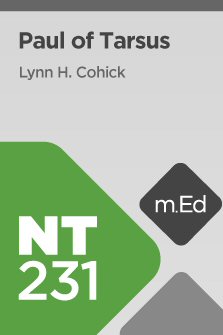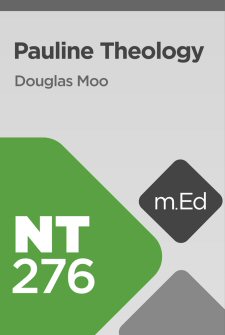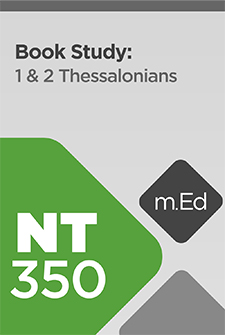New Testament: Advanced Pauline Studies Study Bundle
Digital Logos Edition
Overview
In the New Testament: Advanced Pauline Studies Study Bundle you’ll study the life and writings of Paul the Apostle. You will examine Paul’s letters in detail, see how Paul crafted them for specific occasions to specific groups and understand what their implications are for Christians today. You’ll explore Paul’s theology and learn how scholars in different historical eras have understood his teaching on key concepts like justification by faith. These courses will help you better appreciate this important section of the New Testament.
This title is included in the following collections
You can save when you purchase this product as part of a collection.
Mobile Ed: Master Collection (...
$31,999.99$31,999.99

- NT231 Paul of Tarsus by Lynn H. Cohick
- NT276 Pauline Theology by Douglas J. Moo
- NT395 Perspectives on Paul: Reformation and the New Perspective by Stephen J. Chester
- NT331 Book Study: Paul’s Letter to the Romans by Douglas J. Moo
- NT334 Book Study: Pauls First Letter To The Corinthians by Craig Blomberg
- NT337 Book Study: Paul’s Second Letter to the Corinthians by George H. Guthrie
- NT341 Book Study: Pauls Letters To The Galatians by Douglas J. Moo
- NT343 Book Study: Paul's Letter to the Ephesians by Lynn H. Cohick
- NT345 Book Study: Paul's Letter to the Philippians by Robert B. Sloan
- NT348 Book Study: Paul's Letters to the Colossians and Philemon by Constantine R. Campbell
- NT350 Book Study: 1 & 2 Thessalonians by Jeffrey Weima
- NT225 Survey of the Pastoral Epistles by Kenneth L. Waters Sr.
How to Apply for a Mobile Ed Certificate of Completion
- Complete all Mobile Ed courses in this Study Bundle. This involves viewing all videos and taking all quizzes.
- Write a 750-word response on any topic covered for each course in the Study Bundle. Post your response to the appropriate Faithlife group in the comments section. Search course code here to find group.
- Email certificate@faithlife.com once you have completed all videos and quizzes and have posted responses in the appropriate Faithlife group for each Mobile Ed course in the Study Bundle. Please include your full name, title of completed Study Bundle, and links for each Faithlife group post in your email.
- Our Study Bundle team will review the application and email the Certificate of Completion once you have completed all requirements. Please allow 7–10 business days for review.
- Title: New Testament: Advanced Pauline Studies Study Bundle
- Publisher: Lexham Press
- Product Type: Logos Mobile Education
- Resource Type: Courseware, including transcripts, audio, and video resources
- Courses: 12
- Video Hours: 95
Who was Paul of Tarsus? In this course, Dr. Lynn Cohick draws from the book of Acts as well as Paul’s letters to paint a vivid picture of who he was, what he did, and what he believed. “We want to take a look both at Acts and at Paul’s letters because we want to make sure that we understand Paul not simply as someone who thinks about theology, sits at a desk and writes letters, but also as someone who is doing, who is living out what they claim.”
Dr. Cohick begins with Luke’s perspective in Acts, and draws attention to Paul’s desires and actions and the major events in his life. Then, using Acts as a narrative framework, she looks at Paul’s own writings to reveal more about his personal thoughts and fears. If you want a guided tour through the life and teachings of one of the most influential figures in the Christian church, this is it.
Contents:
Introduction
- Introducing the Speaker and the Course
Unit 1: Paul’s Background
- Introduction to Paul
- Paul’s Setting
- Ancient Rhetoric
- Roman Empire
- Example from Shakespeare
- Jewish World
- Using Community Tags to Enhance the Factbook
Unit 2: Paul the Apostle
- Paul of Tarsus
- Pharisee
- Using Cultural Concepts and Clippings to Research the Pharisees
- Persecutor of the Church
- Paul’s Calling in Acts
- Calling in Galatians
- Called, Not Converted
- Followers of Jesus
- Discovering Early Names for Christians with the Factbook
- Paul’s Theology
- Center of Paul’s Theology
- Social Implications of the Gospel
- Future Implications of the Gospel
- Paul and Empire
- Paul and the New Perspective
- Researching the “Works of the Law” with Searching and Notes
- Paul the Letter Writer
- Rhetorical Approaches in Paul’s Letters
Unit 3: Paul’s Travels
- Starting Our Journey
- Galatians 2 and Acts 11 or 15?
- Paul and Barnabas in Pisidian Antioch
- First Corinthians 15
- Jerusalem Council and the Law
- Galatians, Part 1
- Galatians, Part 2
- Paul’s Visit to Philippi
- Visit to Thessalonica
- Paul’s Message in Athens
- Using Media Search to Find Images and Videos of Mars’ Hill
- Visit to Corinth
- The Message of Thessalonians
- Paul’s Third Missionary Journey
Unit 4: Paul’s Epistles
- First Corinthians
- Paul’s Reconciliation
- Theological Themes
- Romans
- Using Bible Book Guides to Research the Purpose of Romans
- Themes of Romans
- Two Views of Salvation History
- Faith and Justification
- Romans 5–7
- Romans 8–11
- Romans 12
- Paul Arrested in Jerusalem
- Using Ancient Literature to Discover Temple Purity Regulations
- Paul Arrives in Rome
- Colossians
- Ephesians
- Using Propositional Outlines to Trace the Structure of a Passage
- Authorship Question
- Philemon
- Philippians
- Philippians 2–4
- Using Literary Typing to Find All Poetry in the New Testament
- Theology of Philippians
Conclusion
- Paul, the Apostle to the Gentiles
 Dr. Lynn H. Cohick is professor of New Testament at Wheaton College. Dr. Cohick’s special interests include women in the ancient world, the ways that Jews and Christians lived out their faith in the Graeco-Roman world, and building understanding between Jews and Christians today. She has written commentaries on Ephesians and Galatians, Women in the World of the Earliest Christians and coauthored The New Testament in Antiquity.
Dr. Lynn H. Cohick is professor of New Testament at Wheaton College. Dr. Cohick’s special interests include women in the ancient world, the ways that Jews and Christians lived out their faith in the Graeco-Roman world, and building understanding between Jews and Christians today. She has written commentaries on Ephesians and Galatians, Women in the World of the Earliest Christians and coauthored The New Testament in Antiquity.
In NT276 Pauline Theology Dr. Douglas J. Moo organizes Paul’s theology within the new realm of the Gospel of Jesus Christ and the lives of Jesus’ followers. After comparing the new realm to the old realm of the law, Dr. Moo takes you on a journey from the inauguration of the new realm to its culmination, stopping to discuss the people of the new realm and how Jesus’ followers enter into, live within, and enjoy this new realm. This course provides you with a foundation to read, study, teach, and preach the message of the apostle Paul.
Contents:
Introduction
- Introducing the Speaker and the Course
Unit 1: Paul’s Theology and Methodological Issues
- Relating Biblical and Systematic Theology
- Constructing Theology
- Paul’s Missional and Historical Contexts
- Paul’s Journeys and Theological Development
- Searching for the Historical Paul
- Constructing Paul’s Theology
- Determining the Number of Paul’s Letters
Unit 2: Sources and Context for Paul’s Theology
- Paul’s Use of the Old Testament
- Paul’s Understanding of the Old Testament
- Paul’s Contemporary Influences
- Paul’s Eschatological Viewpoint
Unit 3: The New Realm
- The Center of the New Realm
- The Gospel in Paul
- Pauline Christology
- Jesus as Messiah
- Jesus as Son of God
- Jesus as Lord
- Jesus as God
- Christology in Philippians 2:6–11
- Christology in Colossians 1:15–20
Unit 4: The Old Realm
- Addressing Solution and Plight
- The Predicament of Sin
- Definitions of Sin
- The Universality of Sin
- The Results of Sin
- Paul’s View of Human Nature
- Aspects of Human Nature
- Powers of the Old Realm
- Law in the Old Testament
- The Law in Salvation History
- The New Perspective on Judaism
- The New Perspective on Paul
- Evaluating the New Perspective on Paul
- Final Thoughts on the New Perspective on Paul
Unit 5: Inauguration of the New Realm
- Jesus’ Death and Resurrection
- Jesus’ Redemptive Death
- Jesus’ Atoning Death
- Jesus’ Substitutionary Death
- Jesus’ Victorious Death
Unit 6: Experiencing the New Realm
- Experiencing Salvation
- Experiencing Justification
- Old Testament Background for Justification
- Reformation Views on Justification
- Challenges to Reformation Views: Part 1
- Challenges to Reformation Views: Part 2
- Challenges to Reformation Views: Part 3
- Believing in Christ
- Responding to Grace
- Final Justification
- Justification and Resurrection
- Experiencing Reconciliation
- Experiencing Adoption
- Experiencing Sanctification
Unit 7: Entering the New Realm
- Experiencing Grace
- Experiencing Election
- Election and God’s Sovereignty
- Election and Human Responsibility
- Repentance and Faith
- Faith and Obedience
- Gift of the Spirit and Water Baptism
Unit 8: Culmination of the New Realm
- Culmination of Events
- Implications for Believers
- The Intermediate State
- Timing of Events at Christ’s Return
- Implications for Unbelievers
- Believers and Judgment
- The Destiny of Israel
- The Destiny of Creation
- The Timing of the Culmination
Unit 9: People of the New Realm
- The Priority of the Church
- Israel and the Church
- The Church as the Ekklēsia
- The Church as the Body of Christ
- The Church as the Temple of God
- The Lord’s Supper
- The Gifts to the Church
- The Pastoral Letters
- Leadership in the Church
- Female Leadership in the Church
Unit 10: Living in the New Realm
- Living the Christian Life
- Indicatives and Imperatives
- Perfectionism and Moralism
- Christians and the Mosaic Law
- Renewing the Mind
- Living a Holy Life
- Having Regard for Others
- Living in the World
- The Redemption of Creation
Conclusion
- Final Words
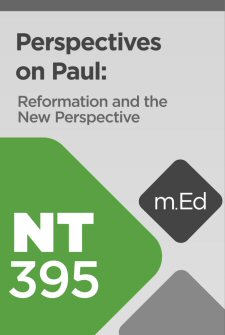
The New Perspective on Paul movement has redefined the bounds of theological discussions around the atonement and justification by faith alone. Dr. Stephen Chester has devoted his career to these doctrines and will equip you to understand all of the positions and key players. You will learn how crucial texts that deal with the works of the law and the faith of Christ have been interpreted throughout church history. He also will help you explore how various understandings of “the flesh” and “this present evil age” influence this area of theology and Christian living.
Contnets:
Introduction
- Introducing the Speaker and the Course
Unit 1: Context of the Class: A Pauline Revolution
- Contemporary Perspectives on Paul
- The Influence of Martin Luther
- Challenge of the New Perspective
- Course Method
- Nature of Reception History
Unit 2: What Is the New Perspective on Paul?
- New View of Judaism: Part 1
- New View of Judaism: Part 2
- New View of the “Works of the Law”
- New View of Paul’s Conscience
- New View of Justification: Part 1
- New View of Justification: Part 2
- Strengths of the New Perspective on Paul
- The New Perspective versus the Reformers
Unit 3: The Human Plight Apart from Christ
- Sin in Contemporary Scholarship
- Sin in Reformation Scholarship
- The Flesh in Reformation Scholarship
- The Flesh in Contemporary Scholarship
- Misunderstanding the Reformers: Paul’s Conscience
- Misunderstanding the Reformers: The Law and the Conscience
Unit 4: Salvation in Christ: Establishing the Issues
- Three Key Issues in Paul’s Soteriology
- Medieval Paraphrase and Paradigm
- Reformation Paraphrase and Paradigm
- New Perspective on Paul Paraphrase and Paradigm
Unit 5: Salvation in Christ: The Works of the Law
- The Exegetical Nature of the Disagreement
- The Nature of Judaism
- Data Supporting the New Perspective on Paul
- Data Supporting the Reformation Perspective
- Texts Emphasizing Ethical Achievement
- What of Galatians 2:16 Itself?
- Conclusions on the Exegetical Debate
Unit 6: Salvation in Christ: Justification by Faith
- The Implied View of the Reformers
- Introducing Luther on Justification
- Luther: Christ Present in Faith
- Luther on Living an Alien Life: Part 1
- Luther on Living an Alien Life: Part 2
- Conclusion on Luther
- Introducing Philip Melanchthon
- Melanchthon’s Contribution
- Melanchthon and Renewal: Part 1
- Melanchthon and Renewal: Part 2
- Introducing John Calvin
- Calvin on Justification and Union with Christ
- Calvin on Justification and the Bond of the Spirit
- The Reformers and Justification: Some Conclusions
- Incorporated Righteousness
Unit 7: Salvation in Christ: The Pistis Iēsou ChristouDebate
- Translation Options
- Subjective Genitive: The Faithfulness of Christ
- Objective Genitive: Faith in Christ
- Similar Theological Destinations
Unit 8: Good Works
- Introduction to Good Works and Justification
- Medieval Interpretation of Galatians 5:6
- Reformers’ Interpretation of Galatians 5:6
- The Works of Faith and Justification: Part 1
- The Works of Faith and Justification: Part 2
Unit 9: Romans 4 as a Test Text
- Introduction to the Debate
- Reformation Trajectories
- Introduction to N. T. Wright on Romans 4
- Strengths of N. T. Wright on Romans 4
- Weaknesses of N. T. Wright on Romans 4: Part 1
- Weaknesses of N. T. Wright on Romans 4: Part 2
- Weaknesses of N. T. Wright on Romans 4: Part 3
- Conclusions on Romans 4: Part 1
- Conclusions on Romans 4: Part 2
Unit 10: Reflections on the Perspectives
- The Advances of the New Perspective on Paul
- Problems with the New Perspective on Paul
- Reconciliation of the Perspectives
- Ministry Implications: Part 1
- Ministry Implications: Part 2
- Ministry Implications: Part 3
Conclusion
- Balancing Perspectives
 Stephen J. Chester is academic dean and professor of New Testament at North Park Theological Seminary, Chicago, the seminary of the Evangelical Covenant Church. He appreciates North Park as a context where “the life of the mind, the goal of practical ministry, and the need for a deep devotional life are held together as equal values.” Dr. Chester is from the UK and came to North Park in 2006, having previously served on the faculty of International Christian College, Glasgow. He is ordained in the Church of Scotland, and is the author of Conversion at Corinth: Perspectives on Conversion in Paul’s Theology and the Corinthian Church and one of the coauthors of Perspectives on our Struggle with Sin: Three Views of Romans 7. He has become deeply interested in the history of Pauline interpretation and is currently writing Righteousness in Christ: Paul, the Reformers, and the New Perspective (forthcoming).
Stephen J. Chester is academic dean and professor of New Testament at North Park Theological Seminary, Chicago, the seminary of the Evangelical Covenant Church. He appreciates North Park as a context where “the life of the mind, the goal of practical ministry, and the need for a deep devotional life are held together as equal values.” Dr. Chester is from the UK and came to North Park in 2006, having previously served on the faculty of International Christian College, Glasgow. He is ordained in the Church of Scotland, and is the author of Conversion at Corinth: Perspectives on Conversion in Paul’s Theology and the Corinthian Church and one of the coauthors of Perspectives on our Struggle with Sin: Three Views of Romans 7. He has become deeply interested in the history of Pauline interpretation and is currently writing Righteousness in Christ: Paul, the Reformers, and the New Perspective (forthcoming).
Dr. Chester’s ministry commitments and experiences have largely been in urban contexts. He is married to Betsy, a kindergarten teacher, and they have two adult sons, Iain and Mark. They are members of Immanuel Evangelical Covenant Church, a multiethnic church in a diverse neighborhood. Stephen enjoys his family, watching and refereeing soccer, and pitching in Chicago softball.
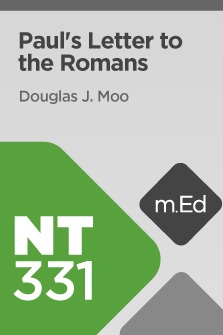
Paul’s epistle to the Romans is one of the most important theological treatises ever written. In this upper-division course, Douglas Moo traces the major theological themes of Romans, following Paul’s flow of thought from argument to argument. Moo covers essential historical and theological backgrounds, and brings students into Romans’ traditional interpretations and the newer ideas developed by the New Perspective on Paul.
Contents:
Introduction
- Introducing the Course and the Speaker
Unit 1: Introduction to Romans
- The Occasion of Romans
- Creating an Introduction to the Book of Romans
- Paul’s Audience for Romans
- The Purpose of Romans
- The Theme and Emphasis of Romans
- The Letter’s Introduction
- Investigating the Genitive Construction in Romans 1:5
- The Theme of the Letter (Romans 1:16–17)
- Conducting a Word Study on the Term “Gospel” in Romans
- The Essence of the Good News
- The Meaning of “Righteousness of God”
- Identifying the Common Greek Root for “Righteousness” and “Justify”
Unit 2: The Universal Reign of Sin
- Humanity’s Need for Salvation
- The Condemnation of Homosexuality
- Jews and the Judgment of God
- Doing What the Law Requires
- Paul and the Law
- Exploring the Different Meanings of the Term “Law” in Romans
- The Spirit and the Law
- Under the Power of Sin
- The Works of the Law
- Evaluating the New Perspective
Unit 3: Justification by Faith
- Justification and the Righteousness of God
- God’s Righteousness and Christ’s Faithfulness
- Righteousness and Redemption
- Comparing English Translations of the Greek Term Hilastērion
- Righteousness and Holiness
- By Faith Alone
- The Doctrine of Justification
- Four Basic Questions on Justification
- The Meaning and Basis of Justification
- The Timing of Justification
- The Means of Justification
- Justification and Judgment
- Abraham’s Faith
Unit 4: The Hope of Salvation
- Following the Argument of Romans 1–8
- Using Visual Filters to See Major Divisions in Romans
- Reading Romans 5–8
- The Historical Adam Debate
- Believers and Sin
- Old Man versus New Man
- Concepts of Righteousness
- Christians and the Law
- The Relationship of Believers to the Old Testament Law
- The Old Testament Law and Christ’s Law
- The Purpose of the Law in Salvation
- Locating All the Questions in the Book of Romans
- The Timing of Paul’s Experience in Romans 7
- The Law of God and the Law of Sin
- The Ministry of God’s Spirit
- Researching the Work of the Holy Spirit in Romans
- The Destiny of Creation
- Christians and Environmentalism
- Assurance for the Future
Unit 5: God’s Faithfulness and Israel
- The Gospel and Israel
- The Title “God” for Christ
- Who Is “Israel”?
- Romans 9 and Election
- Hosea in Romans 9
- Identifying Old Testament Quotes and Allusions in Romans
- Two Kinds of Righteousness
- Israel’s Responsibility
- Has God Rejected His People?
- The Gentile Christian Audience
- The Recurring Pattern in Romans 11:12–32
- “All Israel Will Be Saved”
- Who Is Israel and When Will They Be Saved?
- The Quotation of Isaiah 59:20
- Investigating an Old Testament Quote in Romans 11:26
Unit 6: Christian Conduct
- The Gospel in Everyday Life
- Total Transformation
- Worship in Everyday Life
- The Renewing of the Mind
- Relationships with Other Christians
- Sincere Love
- Governing Authorities
- Submit to the Authorities
- Authority to Punish and Tax
- Love and Law
- Salvation Is Nearer Now
- Liberty and Love
- Addressing the Weak and the Strong
- Exercise Liberty in Love
- Accepting All Brothers and Sisters in Christ
- Paul’s Plans for Ministry
- Paul’s Greetings to the Roman Christians
- Paul’s Greetings to Women
- A Warning and Final Remarks
- The Closing Doxology
Conclusion
- Summary of the Theme
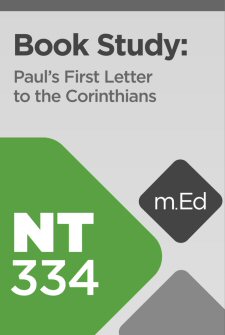
In Book Study: Paul’s First Letter to the Corinthians (NT334) Craig Blomberg steps through the text to explain the big picture and the many issues and controversies found in 1 Corinthians. You will be encouraged in your Christian walk to understand and express your spiritual gifts and to see the contemporary relevance of the issues faced by the Corinthian church. This study reveals the pastoral heart of Paul in both addressing moral and community issues of Christian leadership, factionalism, lawsuits, sexuality and food sacrificed to idols whilst keeping rehabilitation always in mind. Taking a broad-brush approach, you will gain a balanced perspective on spiritual gifts and the importance of love before diving in to examine the controversial topics of tongues and prophecy. There is something of relevance for every Christian in this study which shows that the same issues facing the first century church can be found in the church today.
Contents:
Introduction
- Introducing the Speaker and the Course
Unit 1: Core Theological Beliefs in Philippians
- Introducing the Core Theological Beliefs in Philippians
- The Biblical God of Creation, Redemption, and Restoration
- The Biblical Narrative Reveals God’s Purposes
- Identifying the People of God
- Finding and Studying Old Testament Passages Quoted in the New Testament
- The People of God Are Those in Christ
Unit 2: Christ and the Gospel in Philippians
- Jesus Is the Messiah
- Jesus the Son Acts as the Agent of God
- The Incarnate Jesus Represents God’s People before God
- “In Christ” as Federalism and Substitution
- Researching Passages on Christ as the “Second Adam”
- Gospel from the Old Testament to the Preaching of Jesus
- “Gospel”: Death and Resurrection of Jesus
Unit 3: Other Theological Themes in Philippians
- Discipleship
- Resurrection and New Creation
- Researching the “New Creation”
- The Journey of Death
- Assurance of Salvation
- The Work of the Spirit
Conclusion
- Encapsulating Pauline Theology in Philippians
 Craig Blomberg is distinguished professor of New Testament at Denver Seminary, where he has been teaching since 1986. Blomberg earned degrees from Augustana College, Trinity Divinity School, and Aberdeen University in Scotland. He previously taught at Palm Beach Atlantic College and spent one year in Cambridge as a research fellow with Tyndale House. He has been on translation committees for the New Living Translation, English Standard Version, and the Holman Christian Standard Bible.
Craig Blomberg is distinguished professor of New Testament at Denver Seminary, where he has been teaching since 1986. Blomberg earned degrees from Augustana College, Trinity Divinity School, and Aberdeen University in Scotland. He previously taught at Palm Beach Atlantic College and spent one year in Cambridge as a research fellow with Tyndale House. He has been on translation committees for the New Living Translation, English Standard Version, and the Holman Christian Standard Bible.
Bloomberg is the author, coauthor, or coeditor of numerous books and more than 80 articles in journals or multiauthor works. A recurring topic of interest in his writings is the historical reliability of the Scriptures, and he has also covered such diverse issues as wealth and poverty, hermeneutics, and women in ministry. His books include Jesus and the Gospels: An Introduction and Survey, 2nd ed., Zondervan Exegetical Commentary on the New Testament: James, A Handbook of New Testament Exegesis, Making Sense of the New Testament, Preaching the Parables, and the NIV Application Commentary: 1 Corinthians.
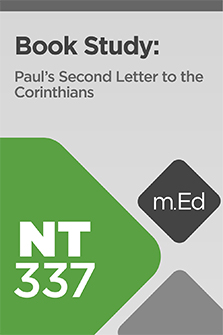
In Book Study: Paul’s Second Letter to the Corinthians, Dr. George Guthrie walks you through the text of 2 Corinthians, where Paul expresses what he thinks about authentic Christian ministry—what does it mean to follow Christ as a real Christian minister in the world? Dr. Guthrie deals with the purpose of each section of the letter, walking through exegesis of the passage and discussing how Paul accomplishes his purpose in that passage. He also covers the implications of Paul’s letter for our lives today.
Contents:
Introduction
- Introducing the Speaker and the Course
Unit 1: Introduction to 2 Corinthians
- A Story from the Streets of Corinth
- Paul’s Sense of Identity
- The City of Corinth
- Corinthian Leadership Values
Unit 2: Letter Opening and Prologue (2 Cor 1:1–11)
- Opening (2 Cor 1:1–2)
- Prologue, Part 1: Praise God for Encouragement (2 Cor 1:3–7)
- Prologue, Part 2: Paul’s Brush with Death (2 Cor 1:8–11)
Unit 3: The Integrity of Paul’s Ministry (2 Cor 1:12–2:13)
- Paul’s Actions Done with Integrity (2 Cor 1:12–14)
- Paul’s Changed Itinerary (2 Cor 1:15–22)
- Painful Encounters with the Corinthians (2 Cor 1:23–2:4)
- Forgive the Offender (2 Cor 2:5–11)
- An Opportunity and an Absence (2 Cor 2:12–13)
Unit 4: Authentic Christian Ministry (2 Cor 2:14–4:6)
- A Word Picture, Part 1 (2 Cor 2:14–16a)
- A Word Picture, Part 2 (2 Cor 2:14–16a)
- A Word Picture, Part 3 (2 Cor 2:14–16a)
- A Word Picture, Part 4 (2 Cor 2:14–16a)
- A Contrast with False Teachers (2 Cor 2:16b–17)
- Competence in Ministry (2 Cor 3:1–6)
- “A Glorious,” Unveiled Ministry, Part 1 (2 Cor 3:7–11)
- “A Glorious,” Unveiled Ministry, Part 2 (2 Cor 3:12–18)
- The Impact of Authentic Ministry (2 Cor 4:1–6)
Unit 5: The Suffering in Paul’s Authentic Ministry (2 Cor 4:7–5:10)
- Gospel Treasure in Clay Pots (2 Cor 4:7–15)
- Eternal Perspective and Temporal Suffering (2 Cor 4:16–18)
- Longing for the Resurrection Body (2 Cor 5:1–5)
- At Home or Absent, Pleasing to the Lord (2 Cor 5:6–10)
Unit 6: Exhortations to Respond to Authentic Ministry (2 Cor 5:11–7:16)
- A Time of Opportunity (2 Cor 5:11–13)
- New Creation (2 Cor 5:14–17)
- A Ministry of Reconciliation (2 Cor 5:18–6:2)
- Paul’s Unexpected Credentials for Ministry (2 Cor 6:3–10)
- Make Room for Us in Your Hearts (2 Cor 6:11–13)
- Living as Distinct People, Part 1 (2 Cor 6:14–7:1)
- Living as Distinct People, Part 2 (2 Cor 6:14–7:1)
- A Concluding Appeal for Openness (2 Cor 7:2–4)
- The Corinthians’ Response (2 Cor 7:5–13a)
- Titus’ Joy (2 Cor 7:13b–16)
Unit 7: Giving and Mission (2 Cor 8:1–9:15)
- Following Through with the Collection (2 Cor 8:1–7)
- Motives for Giving (2 Cor 8:8–15)
- The Mission and Ministry of Titus, Part 1 (2 Cor 8:16–24)
- The Mission and Ministry of Titus, Part 2 (2 Cor 9:1–5)
- Theological Foundations for Giving (2 Cor 9:6–11)
- The Impact of Righteous Giving (2 Cor 9:12–15)
Unit 8: The Malignant Ministry of Paul’s Opponents (2 Cor 10:1–12:13)
- Paul’s Authority and Spiritual Battle (2 Cor 10:1–7a)
- Perspective on Paul’s Authority (2 Cor 10:7b–11)
- Inappropriate and Appropriate Boasting, Part 1 (2 Cor 10:12–18)
- Inappropriate and Appropriate Boasting, Part 2 (2 Cor 10:12–18)
- An Overview of the Fool’s Section (2 Cor 11:1–12:13)
- Putting Up with Fools (2 Cor 11:1–4)
- Paul’s Assessment of the “Super Apostles,” Part 1 (2 Cor 11:5–9b)
- Paul’s Assessment of the “Super Apostles,” Part 2 (2 Cor 11:9c–15)
- Fools and Those Who Welcome Them (2 Cor 11:16–21)
- The “Fool’s Speech,” Part 1 (2 Cor 11:22–29)
- The “Fool’s Speech,” Part 2 (2 Cor 11:30–12:6)
- The “Fool’s Speech,” Part 3 (2 Cor 12:7–10)
- Epilogue of the “Fool’s Speech” (2 Cor 12:11–13)
Unit 9: Preparing for Paul’s Third Visit (2 Cor 12:14–13:14)
- A Direct Confrontation, Part 1 (2 Cor 12:14–18)
- A Direct Confrontation, Part 2 (2 Cor 12:19–21)
- The Third Visit as Stern Accountability, Part 1 (2 Cor 13:1–4)
- The Third Visit as Stern Accountability, Part 2 (2 Cor 13:5–10)
- The Closing (2 Cor 13:11–14)
Conclusion
- A Summary and a Challenge
 Dr. George Guthrie serves as the Benjamin W. Perry Professor of Bible at Union University in Jackson, Tennessee. A specialist in New Testament and Koine Greek, he’s authored numerous articles and has written 11 books, including the NIV Application Commentary: Hebrews.
Dr. George Guthrie serves as the Benjamin W. Perry Professor of Bible at Union University in Jackson, Tennessee. A specialist in New Testament and Koine Greek, he’s authored numerous articles and has written 11 books, including the NIV Application Commentary: Hebrews.
Dr. Guthrie has participated in translation projects, such as the revision of The New Living Translation, and has served as a consultant on the Holman Christian Standard Bible, the New Century Version, and the English Standard Version. He also served for five years as a cochair of the “Biblical Greek Language and Linguistics” section of SBL, has served on the executive committee of the Institute for Biblical Research, and has served on the editorial board for Sheffield’s JSNTS monograph series. At Union University, he has led in the establishment of, and serves as senior fellow in, the Ryan Center for Biblical Studies, which is committed to promoting sound Bible reading, study, and interpretation at the grassroots level of the church. Dr. Guthrie holds both PhD and MDiv degrees from Southwestern Baptist Theological Seminary and a ThM from Trinity Evangelical Divinity School.
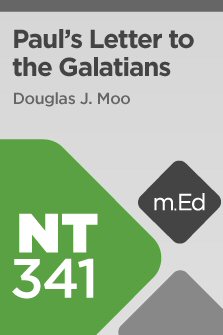
Dr. Douglas Moo, known for his commentaries on Romans and Galatians, lays out his research on this much-debated text. He explores the theme of justification by faith and explains its importance to the Protestant Reformation and the Protestant church today. He discusses the new perspective on Paul and how it relates to Galatians. You’ll also learn important contextual information about who the Galatians were, why Paul wrote to them, and how they might have understood Paul’s letter. Dr. Moo guides you through the text, explaining the major themes and theological elements toward the goal of understanding how Paul’s letter to the Galatians applies to our lives and to the church.
Contents:
Introduction
- Introducing the Speaker and the Course
Unit 1: Introduction and Background
- Who Were the Galatians? Part 1
- Searching for Place Information
- Who Were the Galatians? Part 2
- Why Did Paul Write the Letter?
- The Argument of the Letter
- The Tone of the Letter
- Opening Multiple Passages in Separate Tabs
Unit 2: The Autobiographical Argument
- An Overview of the Argument
- The Road to Damascus
- Paul’s Early Years as a Christian
- Paul’s Jerusalem Consultation
- Conflict in Antioch
- Finding a Book in the Pseudepigrapha
- Justification by Faith
- Works of the Law
- Using the NEAR Search Operator
- “The Faith of Jesus Christ”
- Examining a Grammatical Construction Using the Lexham Syntactic Greek New Testament
- The New Perspective and Galatians
- “Righteousness” Language
Unit 3: The Theological Argument
- The Central Argument
- The Initial Appeal
- The Heart of Paul’s Argument
- Abraham and Faith
- The Law and the Curse
- Habakkuk 2:4 in the New Testament
- The Law and Salvation History
- The Law and Transgressions
- Studying Greek Synonyms with the Bible Sense and Louw-Nida Lexicons
- The Law and a Mediator
- The Law as Paidagōgos
- Union with Christ
- The Stoichea of the World
- Christ Formed in You
- The Story of Hagar and Sarah
- Looking Up Greek Words in a Greek-English Lexicon
- The Old and New Realms
- Justification
- Final Justification and Works
- A “Janus” Text
Unit 4: The Ethical Argument
- Living to Please God
- Freedom, Love, and the Law
- The Spirit and the Flesh
- The Law of Christ
- An Eschatological Warning
Unit 5: The Ending of the Epistle
- A Fitting Ending
- The New Creation
- The Israel of God
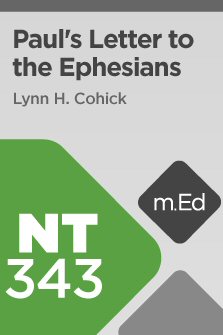
Learn from New Testament and Pauline studies expert Dr. Lynn Cohick as she guides you through each chapter and theological concept in Ephesians, including salvation, the Trinity, and the church. She devotes additional time to exploring God’s vision for marriage, and the institution of slavery. She also explains various interpretive theories—like the new perspective on Paul—and how these theories compare with traditional ideas.
Dr. Cohick’s goal is for you to become better equipped to read the rest of Paul’s letters and more confident in reading the Bible as a whole by better understanding the theology, history, and interpretive possibilities of Paul’s Letter to the Ephesians, and for you to grow in your faith each step of the way.
Contents:
Introduction
- Introducing the Speaker and the Course
Unit 1: Introductory Issues
- The Message of Ephesians
- Authorship: Questions and External Evidence
- Authorship: Literary Evidence
- Investigating Historical Issues in Ephesians with the Bible Book Guide
- Authorship: Theological and Historical Concerns
- Authorship: Pseudonymity
- The Purpose of Ephesians
- Ephesians and the New Perspective on Paul
- Paul’s Imprisonment: Part 1
- Paul’s Imprisonment: Part 2
- Paul’s Imprisonment: Part 3
- The Date of Ephesians
- The Ephesians
Unit 2: Adopted by God (Eph 1)
- Eulogy
- Verbs, Participles, and Prepositions
- Predestination
- Grammatical and Semantic Roles Associated with the Verb “to Predestine”
- God’s Holy People
- The Mystery of Salvation
- Researching Mystērion with the Bible Sense Lexicon
- In Christ
- Sealed by the Spirit
- Adoption to Sonship
- Prayer: Part 1
- Prayer: Part 2
- Using the Exegetical Guide to Analyze the Syntax of Tē Ekklēsia
Unit 3: No Longer Strangers (Eph 2)
- Oneness in Christ: Part 1
- Oneness in Christ: Part 2
- Justification and Works
- Kingdom Work
- Christ Our Peace
- The Dividing Wall
- The Dividing Law
Unit 4: The Mystery of the Gospel (Eph 3)
- Building Rapport
- A Prisoner and Servant
- Mystery
- The Global Church
- Glory in Christ
- Paul’s Second Prayer
- God’s Fullness
Unit 5: Equipped for Ministry (Eph 4)
- Theology within Ethics
- The Characteristics of a Christian
- Grace and God’s Gifts
- Spiritual Gifts
- A Difficult Quotation
- Searching the Pauline Epistles for Old Testament Quotations and Allusions
- The Work of the Church
- Made New
- Practical Advice
- Helping Those in Need
Unit 6: Imitating God (Eph 5:1–21)
- Christian Community
- Canceling Debt
- God’s Economy
- Walk as Christ Walked
- Love and Suffering
- Exposing Evil Deeds
- Paul’s Hymn and Isaiah
Unit 7: Household Codes (Eph 5:22–6:9)
- The Social World of the Ephesians
- Hermeneutics and the Household Codes
- The Institution of Slavery
- Using the Passage Guide to Research Household Codes in Ephesians 5:21–6:9
- Submission
- The Head and the Body
- Performing a Manual Word Study on Kephalē in Ephesians 5:23
- The Oneness of Marriage
Unit 8: Special Topic: Marriage in the New Testament
- Graeco-Roman Marriage Ideals
- Jewish Marriage Ideals
- Divorce
- Marriage Customs in the First Century
- Marriage in the New Testament
Unit 9: The Armor of God (Eph 6:10–24)
- Preparing for Attack
- The Armor
- God’s Own Armor
- Paul’s Closing Remarks
- Using the Concordance to Search for Tychicus in the Bible and Commentaries
Conclusion
- Course Summary
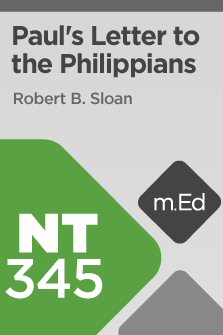
In this course, Dr. Robert Sloan takes you verse by verse through Philippians. You’ll explore themes of fellowship, Christ and the gospel, unity in the church, suffering, death, resurrection, justification, and more. You’ll learn the historical background of the city of Philippi and gain context as to why Paul emphasized some things over others in his letter. Dr. Sloan addresses these topics with his engaging presence and clear communication style. If you desire practical, straightforward exposition on Philippians, Dr. Sloan will not disappoint.
Contents:
Introduction
- Introducing the Speaker and the Course
Unit 1: Paul’s Letter to the Philippians
- The Epistle of Joy
- Exploring Themes in Philippians with Louw-Nida and Visual Filters
- Cultural Causes of Conflict in Philippi
- Paul Responds with a Letter
- Stand Unified and Persevere
- Hold Fast to the Gospel and Rejoice
Unit 2: Thanksgiving, Petition, and Encouragement
- Philippi as a Roman Colony
- Unity Is Our Best Defense
- To the People of God
- Grace and Peace
- Paul’s Prayer of Thanksgiving
- Paul’s Justified Confidence in the Philippians
- Partnership in Grace and in Defending the Gospel
- Love in Suffering
- Studying the “Day of Christ” and “Day of the Lord” with the Topic Guide
Unit 3: Nothing Can Stop the Progress of the Gospel
- The Gospel Spreads in Rome
- The Authority of the Gospel
- Deliverance through Prayers and the Spirit of Christ
- Either Living or Dying Will Exalt Christ
- Both Life and Death Are Journeys
- Confidence in the Provision of Christ
Unit 4: Persevere and Follow Christ’s Example
- Live in a Way Worthy of the Gospel
- Defining the Greek Word Politeuomai with BDAG
- Don’t Be Alarmed by Your Opponents
- Be of One Mind with One Another
- Have the Mind of Christ
- Let Perseverance Result in Salvation
- Creating and Searching a Collection of Philippians Commentaries
- Overcome Divisiveness
- No Matter What Happens, Persevere
- Exploring “Drink Offering” with Feasts and Sacrifices Interactive
Unit 5: An Excursus on Timothy and Epaphroditus
- Plans to Send Timothy
- Honoring Epaphroditus
Unit 6: Stand Firm in the Lord
- Overview of Philippians 3:1–4:1
- Rejoice in the Lord
- What Does It Mean to Be Saved?
- Who Are the People of God?
- Beware of False Teachers and False Credentials
- Understanding How Dogs Were Viewed in the Biblical World
- The Authentic Credentials of God’s People
- Now and Not Yet
- Becoming Fully United with Christ
- Attaining to the Resurrection
- “Pressing On” Is a Mark of God’s People
- The Mindset of Christ
- Suffering with Christ
- Studying Paul’s Life with Media Search and the Timeline Tool
- Our Citizenship in Heaven
- Standing Firm in the Lord
- Examining Pericope Divisions with the Passage Analysis Tool
Unit 7: Closing Exhortations and Greetings
- Euodia and Syntyche
- Passing from Anxiety to the Peace of God
- Comparing Translations of Philippians 4:5
- Living Out Christian Virtues
- Paul’s Contentment and Christ-Sufficiency
- Gratitude for the Philippian Partnership
- Benediction, Final Greetings, and a Closing Blessing
- Performing a Morphological Search and Adding to a Visual Filter
Conclusion
- Conclusion to the Course
 Dr. Robert B. Sloan, Jr. is the president of Houston Baptist University and previously served as president and chancellor of Baylor University, where he was a member of the faculty and the founding dean of George W. Truett Theological Seminary. Dr. Sloan has published extensively and has pastored churches throughout Texas and beyond.
Dr. Robert B. Sloan, Jr. is the president of Houston Baptist University and previously served as president and chancellor of Baylor University, where he was a member of the faculty and the founding dean of George W. Truett Theological Seminary. Dr. Sloan has published extensively and has pastored churches throughout Texas and beyond.
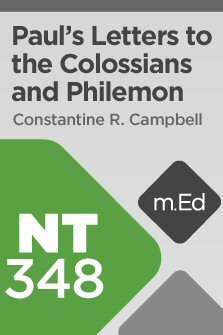
Join Dr. Constantine Campbell as he explores the theology and themes of Colossians and Philemon. Discover the implications of the Christ hymn in Col 1:15–20, which Dr. Campbell calls “the most profound christological statement in the New Testament.” See how Paul addresses the “Colossian heresy,” as well as social and ethical issues like slavery and reconciliation. Through Dr. Campbell’s verse by verse commentary and engaging exposition you’ll gain a deeper understanding of how Christians are called to live and what spiritual maturity looks like.
Contents:
Introduction
- Introducing the Speaker and the Course
Unit 1: Introduction to Colossians
- Overview of Colossians
- Comparing Colossians with Ephesians
- Colossians: Structure
- Colossians: Background
- Locating Colossae with the Atlas Tool
- Colossians: Themes
- Searching for Prepositional Phrases in Colossians
- Christ’s Sufficiency and Supremacy
Unit 2: Theological Instruction (Col 1:1–2:23)
- Address (Col 1:1–2)
- Identifying the Groups Paul Addresses in Colossians 1:1–2
- Thanksgiving (Col 1:3–8)
- Prayer (Col 1:9–14)
- Christ Hymn, Part 1 (Col 1:15–17)
- Exploring All Hymns in the New Testament
- Christ Hymn, Part 2 (Col 1:18–20)
- Impact of the Gospel (Col 1:21–23)
- Revelation of Christ (Col 1:24–27)
- Paul’s Ministry: Goals (Col 1:28–29)
- Paul’s Ministry: Desires (Col 2:1–5)
- Paul’s Ministry: Summary (Col 1:21–2:5)
- Growing in Christ Alone (Col 2:6–8)
- Participation in Christ (Col 2:9–12)
- Results of Participation in Christ (Col 2:13–15)
- Colossians: Application for Today
- Confronting the Heresy (Col 2:16–19)
- False Rules (Col 2:20–23)
- Summary of Paul’s Attack on the Heresy
- Union with Christ in Colossians
Unit 3: Practical Instruction (Col 3:1–4:18)
- Living in the Resurrection (Col 3:1–4)
- Examining Paul’s Use of First Class Conditional Statements
- Setting Aside the Old (Col 3:5–11)
- Putting on the New (Col 3:12–14)
- Investigating Biblical Teaching on Forgiveness
- Living in Peace (Col 3:15–17)
- Summary (Col 3:1–17)
- Wives and Husbands (Col 3:18–19)
- Determining the Significance of the Phrase “In the Lord”
- Complementarianism (Col 3:18–19)
- Children and Parents (Col 3:20–21)
- Slaves and Masters (Col 3:22–4:1)
- The New Testament and Slavery
- Prayer and Speech (Col 4:2–6)
- Final Greetings (Col 4:7–18)
- Preaching from Colossians
Unit 4: Philemon
- Introducing Philemon
- Opening Greeting (Philemon 1–3)
- Thanksgiving (Philemon 4–7)
- Preamble to Paul’s Appeal (Part 1, Philemon 8–12)
- Researching Paul’s Use of Endearing Terms
- Preamble to Paul’s Appeal (Part 2, Philemon 13–16)
- Paul’s Request (Philemon 17–22)
- Closing Greetings and Blessing (Philemon 23–25)
- Philemon and Brotherhood in Christ
- Preaching from Philemon
Conclusion
- Final Words
 Dr. Constantine R. Campbell is associate professor of New Testament at Trinity Evangelical Divinity School. He is the author of Colossians and Philemon: A Handbook on the Greek Text (Baylor, 2013); Paul and Union with Christ: An Exegetical and Theological Study (Zondervan, 2012), which won the 2014 Christianity Today Book Award in Biblical Studies; and numerous other books.
Dr. Constantine R. Campbell is associate professor of New Testament at Trinity Evangelical Divinity School. He is the author of Colossians and Philemon: A Handbook on the Greek Text (Baylor, 2013); Paul and Union with Christ: An Exegetical and Theological Study (Zondervan, 2012), which won the 2014 Christianity Today Book Award in Biblical Studies; and numerous other books.
In this course on 1 and 2 Thessalonians, Dr. Jeffrey Weima provides an in-depth look at two of Paul’s most intriguing letters. Dr. Weima begins with the historical background of the letters. He provides with an overview of ancient Thessalonica and the founding of the Thessalonian church. From there, he moves into a detailed exegesis of 1 and 2 Thessalonians which includes grammatical, historical and literary analysis, as well as modern application. You will come away from the course with a better understanding and appreciation of these letters.
Contents:
Introduction
- Introducing the Speaker and Course
Unit 1: The “Big Picture” of First Thessalonians
- Strategic Location
- Favored Political Status
- Unique Government Structure
- Religiously Pluralistic Environment
Unit 2: Gospel Comes to Thessalonica
- Philippi to Thessalonica
- Three Sabbath Synagogue Ministry
- Post Synagogue Ministry
- Opposition to Paul’s Ministry
- Paul and Silas Forced to Leave
Unit 3: Letter Opening and Thanksgiving (1 Thess 1:1–10)
- Letter Opening
- Introducing the Thanksgiving Section
- Form and Function (Part 1)
- Form and Function (Part 2)
- Big Picture of the Letter
- First Theme: Paul’s Integrity
- Second Theme: Persecution
- Third Theme: Proper Moral Conduct
- Fourth Theme: Second Coming of Christ
Unit 4: Paul’s Picture of a Pastor and Parishioners (1 Thess 2:1–12)
- Paul’s Problem
- Paul’s Solution
- Picture 1: Infant
- Picture 2: Nursing Mother
- Picture 3: Father
Unit 5: Do Not Give Up (1 Thess 2:17–3:10)
- Internal Structure of the Passage
- Literary Analysis
- Don’t Give Up on Paul (Part 1)
- Don’t Give Up on Paul (Part 2)
- Don’t Give Up on the Faith (Part 1)
- Don’t Give Up on the Faith (Part 2)
- God Hasn’t Given Up on You
- Application
Unit 6: Sanctity of Sex (1 Thess 3:12–4:8)
- Transitional Prayers
- Introduction
- Setting the Stage: Modern Society
- Setting the Stage: Ancient Society
- Structure of Paul’s Appeal
- The Claim
- The Commands
- The Causes (Part 1)
- The Causes (Part 2)
- Conclusion to Biblical View of Sex
Unit 7: Jesus Is Coming Again! (1 Thess 4:13–18)
- Christ’s Return
- Grammatical Interpretation (Part 1)
- Grammatical Interpretation (Part 2)
- Structure
- Historical Analysis (Part 1)
- Historical Analysis (Part 2)
- Theological Analysis
- Logic of Verse 14
- Summary and Application
- The Rapture (Part 1)
- The Rapture (Part 2)
- Summary
Unit 8: Ready and Steady for the Day of the Lord (1 Thess 5:1–11)
- Introduction
- Trouble in the World
- Trouble in the Text
- Structure of the Text
- Opening Assertion and Reason 1
- Result
- Reason 2 and Conclusion
- Application: Trouble in the World
Unit 9: Life in the Family of God (1 Thess 5:12–22)
- Introduction
- Trouble in the Text
- Structure of the Text
- Respecting Congregational Leaders
- Ministering to Troubled Congregational Members
- Ministering to the Weak
- God’s Will in Congregational Worship
- Testing Prophecy
- Letter Closing
Unit 10: Second Thessalonians: Overview, Thanksgiving (2 Thess 1:1–12)
- Big Picture
- Letter Opening
- Introduction to Thanksgiving
- Structure of the Thanksgiving
- Two Unique Features of the Thanksgiving
- Two Causes of Thanksgiving (Part 1)
- Two Causes of Thanksgiving (Part 2)
- Persecution
- Comfort (Part 1)
- Comfort (Part 2)
- Just Judgment of God
- The Challenge
- Summary, Setting the Stage
Unit 11: Comfort Concerning the Day of the Lord (2 Thess 2:1–17)
- Title and Difficulty of Passage
- Character and Ending of Passage
- Structure of the Passage
- The Crisis: Meaning of the False Claim
- The Crisis: Source of the False Claim
- The Correction (Part 1)
- The Correction (Part 2)
- Comfort
- Command
- Closing Prayer
Unit 12: Exhortations Concerning Rebellious Idlers (2 Thess 3:1–18)
- Preliminary Issues (Part 1)
- Preliminary Issues (Part 2)
- Preliminary Issues (Part 3)
- Opening Command
- Example of Paul (Part 1)
- Example of Paul (Part 2)
- Teaching of Paul
- Applying Paul’s Example and Teaching
- Closing Commands
- Application: Attitude toward Work
- Application: Importance of Church Discipline
- Letter Closing
Conclusion
- Equipped to Be Ready and Steady
 Jeffrey A.D. Weima is professor of New Testament at Calvin Theological Seminary in Grand Rapids, Michigan, where he has taught for more than 20 years. He is the author of Neglected Endings: The Significance of the Pauline Letter Closings and the coauthor (with Stanley Porter) of An Annotated Bibliography of 1 and 2 Thessalonians. He has taught courses all over the world, has authored numerous scholarly articles, and leads biblical study tours to Greece, Turkey, and Italy.
Jeffrey A.D. Weima is professor of New Testament at Calvin Theological Seminary in Grand Rapids, Michigan, where he has taught for more than 20 years. He is the author of Neglected Endings: The Significance of the Pauline Letter Closings and the coauthor (with Stanley Porter) of An Annotated Bibliography of 1 and 2 Thessalonians. He has taught courses all over the world, has authored numerous scholarly articles, and leads biblical study tours to Greece, Turkey, and Italy.
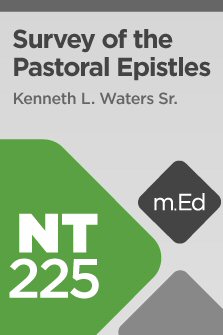
Explore the content and major themes of 1 and 2 Timothy and Titus with New Testament Professor Kenneth Waters Sr. You’ll examine the doctrine of salvation, learn the difference between “imminent” and “immanent” eschatology, gain background information on Timothy and Titus, and see the bigger picture of where and how these letters fit in with the rest of Paul’s journeys and our own spiritual formation.
Dr. Waters also looks at the controversies that surround the interpretation of these texts. You’ll gain new insight into Paul’s remarks about slavery and the roles of women in the church.
Contents:
Introduction
- Introducing the Speaker and the Course
Unit 1: Authorship
- Arguments for Paul
- Arguments against Paul
- Implications
Unit 2: Seven Themes
- 1. Sound Doctrine
- Reverse Interlinears, Inline Search, and First Class Conditionals
- Sound Doctrine: Subthemes 1–6
- Sound Doctrine: Subthemes 7–8
- Conclusions about Proto-Gnosticism
- 2. Salvation: Already/Not Yet
- Using Inline Search and Louw-Nida Numbers
- Salvation Subthemes
- Salvation through Childbearing (1 Timothy 2:15): Four Options
- Childbearing (1 Timothy 2:12–15): An Allegory
- Using Commentaries with Ancient Literature for Exegesis
- Childbearing (1 Timothy 2:12–15): Ephesian Culture
- Salvation as Present and Future: Summary
- 3. Salvation in Our Conduct and Relationships
- Salvation in Relationships: In the Household
- Excursus: Slavery in the Transformed Haustafeln
- 4. Salvation Is Trinitarian
- Using Propositional Outlines to Study Chiasms
- Excursus: Election versus Predestination
- 5. God and Christ
- Excursus: God and Jesus Christ (Titus 2:13)
- 6. Christ Will Return
- 7. Household of God
- Using BDAG to Search for Multiple Words Simultaneously
- Paterfamilias
- Excursus: Priscilla and Women in the Church
Unit 3: Ethics and Eschatology: A Comparative Discussion
- Holy Spirit or Sound Doctrine as Agent of Transformation
- Sound Doctrine and the Spirit of Christ
- Purity and Justification
- Salvation, Works, and Eschatology
- Kingdom of God: Immanent in Luke-Acts
- Kingdom of God: Imminent in Pastoral Epistles
Unit 4: Paul’s Journeys and Correspondence
- First Missionary Journey
- The Jerusalem Council
- Jewish Roots of the Jerusalem Compromise
- Second Missionary Journey
- Third Missionary Journey
- Journey to Rome
- Coupling the Interactive Atlas with Louw-Nida Place Numbers and Media Browser
- Paul’s Correspondence
- Concluding Years of Paul’s Ministry
- Paul in Ephesus (Part 1)
- Paul in Ephesus (Part 2)
- Enhancing Factbook with Media Browser and Biblical Event Navigator
Unit 5: Timothy and Titus
- Timothy’s Background
- Timothy’s Parents
- Timothy: Paul’s Helper
- Timothy: Paul’s Ambassador and Companion
- Timothy: Bishop and Prisoner
- Titus and Crete
- Titius Justus
- Titus: Paul’s Companion and Ambassador
- Paradigms for Paul
Unit 6: Epistles as Occasional Correspondence
- 1 Timothy: Background and Purpose
- Construct a Commentary Concordance with a Visual Filter
- 1 Timothy: Church Order and Conduct
- 1 Timothy: Piety and Relationships
- Titus: Background and Occasion
- 2 Timothy: Background and Occasion
- 2 Timothy: Warning about Last Days
Conclusion
- Arguments Challenged
 Dr. Kenneth L. Waters, Sr. is professor of New Testament and associate dean of the division of religion and philosophy at Azusa Pacific University. He specializes in Gospel studies, the Pauline Epistles, apocalyptic literature, biblical ethics, New Testament and early Christian literature, and African-American religious history. Dr. Waters has authored several books, including Afrocentric Sermons: The Beauty of Blackness in the Bible (Judson Press, 1993). In addition to being active in overseas missions, he has served as a senior pastor for over 28 years.
Dr. Kenneth L. Waters, Sr. is professor of New Testament and associate dean of the division of religion and philosophy at Azusa Pacific University. He specializes in Gospel studies, the Pauline Epistles, apocalyptic literature, biblical ethics, New Testament and early Christian literature, and African-American religious history. Dr. Waters has authored several books, including Afrocentric Sermons: The Beauty of Blackness in the Bible (Judson Press, 1993). In addition to being active in overseas missions, he has served as a senior pastor for over 28 years.
